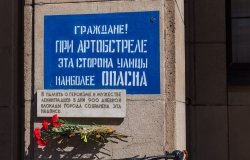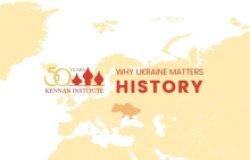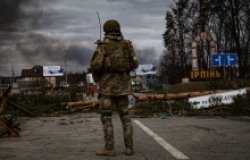Prelude to Revolution: Deconstructing Society in Hungary, 1949-1953
Bianca Adair, Former Fulbright Scholar to Austria and Hungary and Title VIII EES Grant Recipient
Overview
Summary of the East European Studies discussion with Bianca Adair, a former Fulbright Scholar to Austria and Hungary and a Title VIII-supported EES Grant Recipient.
Recent revelations of associations between current politicians and the secret police during the communist regime have highlighted just how little is known about the secret police in Hungary and the scope of its actions. To illuminate one aspect of this relationship, Dr. Adair provided a detailed assessment of the program of internal deportations and internment camps conducted by the Hungarian government and secret police over the period of 1949-1953. This assessment is based on her research conducted at the National Archives in Budapest.
Under Soviet influence, the limited powers of the secret police rapidly expanded to control all aspects of internal security in Hungary by the early 1950s, increasingly employing coercion to reorient society to the demands of Stalinization. Two areas in which the secret police were especially active included the internment camps and the internal deportation activities, which were used to remove societal challenges to the communist government. Approximately 85% of those interned in the camps were political opponents of the regime.
The secret police also forcibly relocated thousands of people from 1950-1952 in order to obtain property and housing for the communist party and its members. While thousands were shipped east, many more were imprisoned and harassed. In one year alone, more than 26,000 people were removed from Budapest. In addition, more than 7,000, mostly from the south and west of Hungary, were arrested as imperialists or Titoists and relocated to a camp in eastern Hungary. The massive population transfers, occurring in such a short period of time, made housing and jobs hard to secure. Consequently, those deported experienced horrible living conditions and performed slave labor primarily on collective farms until a general amnesty was granted by reformist Prime Minister Imre Nagy in 1953.
The amnesty, however, exposed the existing conflict between the government and society because certain segments of the population had prospered in some way from the internal deportations, and the release of the detainees directly challenged their positions. As a result, the victims of internal exile were not permitted to return home and the Ministry of Interior even went as far as blocking the detainees' ability to obtain jobs in their former towns. Those amnestied were released in stages and many were "dissuaded" from returning to and claming their property. This strain revealed that the frictions in the country existed everywhere, not just in Budapest. Because so little was known about the activities of the secret police, people did not know who to blame and thus directed their resentment at the reformers of the Nagy government.
Hungarians are still trying to determine the magnitude and scope of what happened during this period and many believe that the communists need to pay for their crimes as the Nazis did. Though these incidents have not generated much discussion in Hungary, Dr. Adair believes that they will slowly become important topics, as some of those internally exiled have begun inquiring as to whether they are entitled to any compensation for the labor they performed or the property they lost during the Stalinist period of communist rule.
Hosted By

Global Europe Program
The Global Europe Program is focused on Europe’s capabilities, and how it engages on critical global issues. We investigate European approaches to critical global issues. We examine Europe’s relations with Russia and Eurasia, China and the Indo-Pacific, the Middle East and Africa. Our initiatives include “Ukraine in Europe” – an examination of what it will take to make Ukraine’s European future a reality. But we also examine the role of NATO, the European Union and the OSCE, Europe’s energy security, transatlantic trade disputes, and challenges to democracy. The Global Europe Program’s staff, scholars-in-residence, and Global Fellows participate in seminars, policy study groups, and international conferences to provide analytical recommendations to policy makers and the media. Read more
Thank you for your interest in this event. Please send any feedback or questions to our Events staff.










